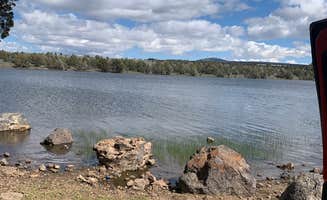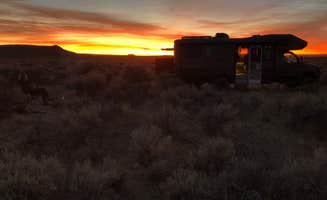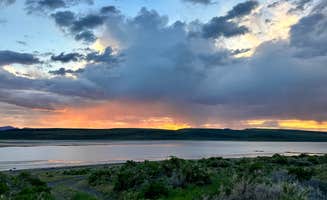Dispersed camping near Summer Lake, Oregon offers primitive overnight options across Bureau of Land Management and National Forest lands. The region sits at approximately 4,300 feet elevation in Oregon's high desert, characterized by volcanic terrain, juniper woodlands, and dramatic temperature fluctuations. Camping access ranges from maintained gravel roads to rough dirt tracks requiring high-clearance vehicles.
What to do
Fishing opportunities: At Duncan Reservoir Campground, anglers can catch fish and observe wildlife including turtles. According to Liona L., the reservoir is "full of fish and turtles and cows across the way and birds," making it an excellent spot for wildlife viewing while fishing.
Swimming in remote creeks: Paradise Creek offers natural swimming options where Paradise Creek meets the Sycan River. Matt E. notes it has a "great little swimming area for the kids and plenty of crawdads," providing a refreshing spot during summer heat.
Exploring volcanic features: Volcanic landscape exploration is possible at dispersed sites like Hole In The Ground, where trails lead into a massive volcanic crater. Rick A. explains, "you can walk the trails down into it and back up. Typical high desert semi forested terrain, decent roads, but bring a map, it's a hole, and therefore not visible until you're right up on it."
What campers like
Dark sky stargazing: The minimal light pollution creates exceptional stargazing conditions. James G. from Lake Abert US 395 South Pullout mentioned the area is "very quiet, dark at night to enjoy the dark skies and stargazing!!"
Solitude and privacy: Many dispersed sites offer privacy despite proximity to highways. At Paradise Creek, Matt E. appreciates that it's a "great spot away from everyone" with only 3 camping spots available.
Wildlife viewing: The diverse ecosystem supports various wildlife viewing opportunities. Austin R. reports, "We saw a Coyote on the hill leading to the scarp" while camping at Lake Abert. The nearby reservoirs attract waterfowl, while grazing cattle are common in surrounding lands.
What you should know
Difficult navigation: Unmarked roads and limited signage make navigation challenging. Rick A. advises, "bring a map... We used power poles that run nearby, as well as the railroad tracks, to orient ourselves so as not to get lost."
No facilities at most sites: Deschutes NF - HWY 31 and similar locations offer no amenities. Michael and Karen M. report, "no facilities of any kind, and patchy cell service" at highway pullouts.
Temperature extremes: Night temperatures drop significantly even in summer. Rick A. notes, "The temperature during the day was around 85, and pretty comfortable, but at night it dropped down to around 40. We were pretty cold since we had counted on a campfire."
Variable water conditions: Water sources are unreliable. Michael and Karen M. observed at Auger Creek Dispersed that "Silver Creek may be dry, as it has been since 2021."
Road access concerns: Access roads deteriorate with weather and distance from highways. Matt E. warns that at Paradise Creek, "Road is a little rough getting in." Similar conditions exist at many primitive sites.
Tips for camping with families
Bring water recreation gear: Kids enjoy water activities at reservoir sites when water is present. Liona L. enjoyed camping at Duncan Reservoir where they "watched a beautiful sunset and fell asleep to distant cow lowing."
Pack for extreme temperatures: Children need warm clothing for nighttime, even in summer. Temperatures regularly swing 40-45°F between day and night, requiring appropriate sleeping bags and clothing layers.
Teach navigation skills: Use camping as an opportunity to teach map reading and orientation skills. Landmarks like power lines, mountains, and roads become important reference points in this remote terrain.
Prioritize waste management: With no trash facilities, families must pack out all waste. Ray & Terri F. encountered an unfortunate situation where "some disgusting person left a large nasty pile of feces soiled jeans, pee pad, wipes, etc." Make proper waste disposal a priority.
Tips from RVers
Seek level ground: CV BLM dispersed and similar areas require careful site selection for leveling. Sterling P. notes, "We took a smaller 4wd RV here and the road got really rough right after this spot," suggesting careful assessment of road conditions before proceeding.
Check road conditions: Many primitive camping areas near Summer Lake have access limitations. Frank M. advises about Deschutes NF sites that they're "suitable for overnight or longer stay" but "may be blocked by snow in winter."
Plan for noise considerations: Highway proximity affects sound levels at some sites. Frank M. notes "some road noise during day" at Deschutes NF sites near Highway 31, while more secluded options provide quieter alternatives.
Water conservation strategies: With no hookups or water sources, RVers must carry all water needed. Full-timers Ray & Terri F. successfully stayed at Lake Abert in their "36 ft Class A with a Cherokee Trailhawk tow" but needed to be completely self-sufficient.




